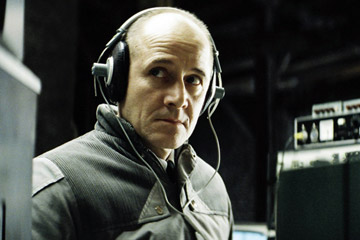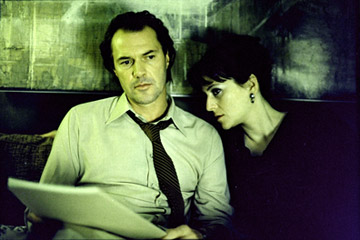The Lives of Others
(Das Leben Der Anderen)


The Lives of Others just got a shot of free publicity by winning the 2007 Academy Award for Best Foreign Film. This award continues a streak of wins, including 7 German Film Awards (in most major categories), 4 additional nominations, and a slew of other wins in international competitions. After watching the film, it's easy to see people are pouring so many accolades onto The Lives of Others. The movie takes place in 1984 East Germany, where the fear of the Stasi and their huge informant network suppress freedom of all sorts. It is a tense look at a period of time that was really only a little more then twenty years ago, but feels much older.
Georg Dryman (Sebastian Koch, Amen, Gloomy Sunday) is East Germany's only "non-subversive" playwright. The government like him, and he thinks that he is beyond suspicion. Hauptmann Gerd Wiesler (Ulich Muhe, Snowland, Amen) believes otherwise, and under direction from his superiors, begins spying on Dryman. This means installing cameras and microphones all over the apartment that Dryman shares with actress Chista-Marie Sieland (Martina Gedeck, The Good Shepherd, Mostly Martha), who is having an affair with the cultural minister.
Writer/director Florian Henckel von Donnersmarck begins things a bit slowly. Wiesler, a creepy looking officer with little to no life, is obviously star-struck with Sieland. He dutifully takes notes of all their actions and conversations, and even has the tact to write that they "presumably have intercourse" instead of detailing out any sordid details. The real drama begins with Dryman's friend commits suicide. Dryman does have some sympathies with the West, but decides to anonymously write a highly subversive article and print it in the West. The climate around Dryman and his friends is already dangerous, but these acts constitute treason. Muhe is great as Wiesler. He begins as the stereotypically emotionless military officer. But as he is increasingly exposed to something far outside his comfort zone, his emotional walls begin to crumble, even as he tries to keep his stoic facade.
In one highly tense moment, Dryman and his friends test Dryman's apartment to see if there are any bugs. In other words, they are testing Wiesler. What they do not know is that Wiesler is so wrapped up in the lives of Dryman and Sieland that he now believes that they are friends. Wiesler, not knowing that he is being tested, gives a 'freebie' to his "friend." Thus, Dryman now believes that he can work in security. The rest of the film is nerve-wracking. Dryman drafts his article, while Wiesler, still dutifully transcribing notes of all conversations, writes that Dryman is drafting a play commemorating the GDR's fortieth anniversary. Both men are doing extremely dangerous things, that can have serious consqeuences for both of them. And von Donnersmarck paces things out, sometimes excruciatingly slow. The Lives of Others works because it functions both as a historical movie and as an intense psychological drama. At various times during the film, Dryman and Wiesler need to examine their fundamental beliefs and value systems - what do they truly believe is right and wrong?